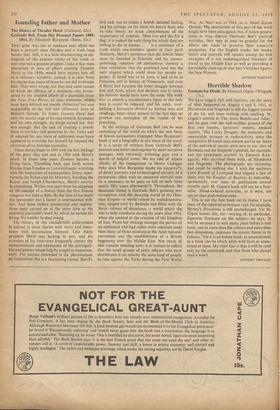Founding Father and Mother
THAT great wits are to madness near allied has been a proverb since Dryden and a truth long before that. Still, it is a little disconcerting to dis- tinguish all the exterior marks of the crank in one who was a genuine prophet. I take it that most journalists or men of affairs meeting Theodor Herzl in the 1890s would have written him off as a visionary eccentric. Indeed, it is clear from his diaries that many of those he met did so dismiss him. They were wrong, but they had some reason to doubt the efficacy of a messianic idea propa- gated by the unaided efforts of a journalist from the Neue Freie Presse, an idea, moreover, which must have seemed not merely chimerical but also undesirable to the rich and influential Jews of Western Europe. To found Zionism Herzl had only the secular urge of his race towards Jerusalem and his own strength. As things turned out, that was enough. But the task of creating a Jewish State in territory still governed by the Turks and ill adapted for any form of settlement must have appeared to everyone but himself far beyond the resources of an Austrian journalist.
These diaries begin in 1895 with the first inklings of the great idea and end in 1904 with Herzl's death. In those nine years Zionism became a living force. Travelling back and forth across Europe from London to Constantinople, wrestling with the hesitations of cosmopolitan Jewry, inter- viewing the Sultan and his Ministers, bearding the Kaiser and Joseph Chamberlain, Herzl's activity is astonishing. Within two years from his adoption of the concept of a Jewish State the first Zionist congress was held at Bale. By the time of his death the movement was a factor in international poli- tics. And these endless journeyings and negotia- tions were carried on at the same time as the ordinary journalist's work by which he earned his living. No wonder he died young.
The history of this considerable achievement is related in these diaries with verve and some- times with unconscious humour. Like many prophets Herzl was lacking in tact, and his accounts of his interviews frequently convey "the embarraisment and annoyance of the principali- ties and powers whose help he sought so importun- ately. For anyone interested in the phenomenon of nationalism this is a fascinating record. Herzl's
first task was to create a Jewish national feeling, ' and his jottings on the form his future State was to take betray an acute consciousness of the importance of symbols. 'Men live and die for a flag; it is indeed the only thing for which they are willing to die in masses . . .' is a statement of a truth which one-worlders ignore at their peril. Similarly, Herzl's insistence that the Jewish State must be founded in Palestine and his uncom- promising rejection ot% alternatives showed a clear realisation that the promised land was the only magnet which could draw his people to- gether. If Israel was to be born, it had to be in Palestine, not in Kenya or Venezuela, and even if Herzl had foreseen the bitter struggle between Jew and Arab, which that decision was to cause, his opinion would have been the same. His work was to release a revolutionary force in the only way it could be released, and his tomb, over- looking a Jerusalem divided by barbed wire and sandbags, bears silent witness to the fact that no prophet can anticipate all the results of his preaching.
In the writings of Gertrude Bell can be seen something of the• world on which the new force of Jewish nationalism impinged. Miss Burgoyne's book is not a biography in any sense of the word. It is a series of extracts from Gertrude Bell's journals and letters tied together by short narrative passages, with extremely irritating gaps and a dearth of helpful notes. We are told of Alpine climbs, of the engagement to Henry Cadogan (why does Miss Burgoyne doubt his sincerity?), of desert journeys and archaeological surveys, of a ,mysterious affair with an unnamed married man (is it necessary to be quite so full of dark hints nearly fifty years afterwards?). Throughout, the dominant theme is Gertrude Bell's growing pre- occupation with the decaying world of the Otto- man Empire—a world ruined by maladministra- tion, ranged over by Bedouin and filled with the fierce colours of decadence, a world which she was to help transform during the years after 1914, when she assisted at the creation of the kingdom of Iraq. From her writings emerges the picture of an enthusiast who had rather more common sense than many of those involved in the Arab national movement and the establishment of a British hegemony over the Middle East. Not much of that remains standing now; it is curious to reflect that the small groups of army officers who have overthrown it are exactly the same kind of people as rose against the Turks during the First World War. As Nuri was in 1914, so is Abdel Karim Qassim. The destruction of this part of her work might have been anticipated, but, if future genera- tions in Iraq distrust Gertrude Bell's political activities, they may at least be grateful for the efforts she made to preserve their country's antiquities. For the English reader her books, letters and journals will remain among the best examples of a not undistinguished literature of travel in the Middle East as well as providing a formidable close-up of that late-Victorian figure: the New Woman.
ANTHONY HARTLEY






























 Previous page
Previous page